Fleurs du Mal Magazine


.jpg)
Delmira Agustini
(1886-1914)
Inextinguibles
¡Oh, tú que duermes tan hondo que no despiertas!
Milagrosas de vivas, milagrosas de muertas,
Y por muertas y vivas eternamente abiertas,
Alguna noche en duelo yo encuentro tus pupilas
Bajo un trapo de sombra o una blonda de luna.
Bebo en ellas la Calma como en una laguna.
Por hondas, por calladas, por buenas, por tranquilas
Un lecho o una tumba parece cada una.
Delmira Augustini poetry
fleursdumal.nl magazine
More in: Agustini, Delmira, Archive A-B
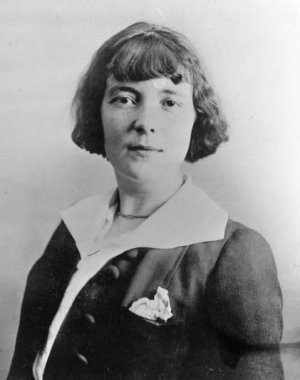
Katherine Mansfield
(1888-1923)
A Little Boy’s Dream
To and fro, to and fro
In my little boat I go
Sailing far across the sea
All alone, just little me.
And the sea is big and strong
And the journey very long.
To and fro, to and fro
In my little boat I go.
Sea and sky, sea and sky,
Quietly on the deck I lie,
Having just a little rest.
I have really done my best
In an awful pirate fight,
But we captured them all right.
Sea and sky, sea and sky,
Quietly on the deck I lie–
Far away, far away
From my home and from my play,
On a journey without end
Only with the sea for friend
And the fishes in the sea.
But they swim away from me
Far away, far away
From my home and from my play.
Then he cried “O Mother dear.”
And he woke and sat upright,
They were in the rocking chair,
Mother’s arms around him–tight.
Katherine Mansfield poetry
fleursdumal.nl magazine
More in: Archive M-N, Mansfield, Katherine
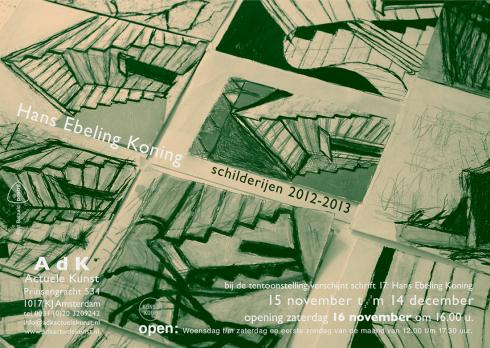
Solo-tentoonstelling Hans Ebeling Koning
bij Galerie AdK Actuele Kunst Amsterdam
SOLO 2012/2013
Hans Ebeling Koning
bij de tentoonstelling verschijnt
kunstenaarsschrift zeventien: 2012/2013
Hans Ebeling Koning
16 november t/m 14 december 2013
Galerie AdK Actuele Kunst
Prinsengracht 534
1017 KJ Amsterdam
# interview Hans Ebeling Koning
fleursdumal.nl magazine
More in: Art & Literature News, Hans Ebeling Koning
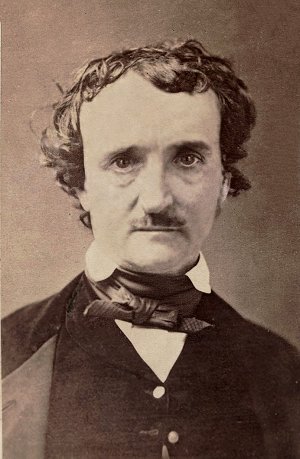
Edgar Allan Poe
(1809 – 1849)
Evening Star
‘Twas noontide of summer,
And mid-time of night;
And stars, in their orbits,
Shone pale, thro’ the light
Of the brighter, cold moon,
‘Mid planets her slaves,
Herself in the Heavens,
Her beam on the waves.
I gazed awhile
On her cold smile;
Too cold- too cold for me-
There pass’d, as a shroud,
A fleecy cloud,
And I turned away to thee,
Proud Evening Star,
In thy glory afar,
And dearer thy beam shall be;
For joy to my heart
Is the proud part
Thou bearest in Heaven at night,
And more I admire
Thy distant fire,
Than that colder, lowly light.
Edgar Allan Poe poetry
fleursdumal.nl magazine
More in: Archive O-P, Poe, Edgar Allan

Dante Alighieri
(1265-1321)
Death, always cruel
Eath, always cruel, Pity’s foe in chief,
Mother who brought forth grief,
Merciless judgment and without appeal!
Since thou alone hast made my heart to feel
This sadness and unweal,
My tongue upbraideth thee without relief.
And now (for I must rid thy name of ruth)
Behoves me speak the truth
Touching thy cruelty and wickedness:
Not that they be not known; but ne’ertheless
I would give hate more stress
With them that feed on love in very sooth.
Out of this world thou hast driven courtesy,
And virtue, dearly prized in womanhood;
And out of youth’s gay mood
The lovely lightness is quite gone through thee.
Whom now I mourn, no man shall learn from me
Save by the measure of these praises given.
Whoso deserves not Heaven
May never hope to have her company.
“Death, always cruel” was translated into English by D.G. Rossetti (1828-1882)
Dante Alighieri poetry
fleursdumal.nl magazine
More in: Archive C-D, Dante Alighieri, Rossetti, Dante Gabriel

Elizabeth Barrett Browning
(1806 – 1861)
The Cry Of The Children
Do ye hear the children weeping, O my brothers,
Ere the sorrow comes with years?
They are leaning their young heads against their mothers—
And that cannot stop their tears.
The young lambs are bleating in the meadows;
The young birds are chirping in the nest;
The young fawns are playing with the shadows;
The young flowers are blowing toward the west—
But the young, young children, O my brothers,
They are weeping bitterly!—
They are weeping in the playtime of the others
In the country of the free.
Do you question the young children in the sorrow,
Why their tears are falling so?—
The old man may weep for his to-morrow
Which is lost in Long Ago—
The old tree is leafless in the forest—
The old year is ending in the frost—
The old wound, if stricken, is the sorest—
The old hope is hardest to be lost:
But the young, young children, O my brothers,
Do you ask them why they stand
Weeping sore before the bosoms of their mothers,
In our happy Fatherland?
They look up with their pale and sunken faces,
And their looks are sad to see,
For the man’s grief abhorrent, draws and presses
Down the cheeks of infancy—
“Your old earth,” they say, “is very dreary;”
“Our young feet,” they say, “are very weak!
Few paces have we taken, yet are wearyÑ
Our grave-rest is very far to seek.
Ask the old why they weep, and not the children,
For the outside earth is cold,—
And we young ones stand without, in our bewildering,
And the graves are for the old.
“True,” say the young children, “it may happen
That we die before our time.
Little Alice died last year—the grave is shapen
Like a snowball, in the rime.
We looked into the pit prepared to take her—
Was no room for any work in the close clay:
From the sleep wherein she lieth none will wake her
Crying, ‘Get up, little Alice! it is day.’
If you listen by that grave, in sun and shower,
With your ear down, little Alice never cries!—
Could we see her face, be sure we should not know her,
For the smile has time for growing in her eyes—
And merry go her moments, lulled and stilled in
The shroud, by the kirk-chime!
It is good when it happens,” say the children,
“That we die before our time.”
Alas, alas, the children! they are seeking
Death in life, as best to have!
They are binding up their hearts away from breaking,
With a cerement from the grave.
Go out, children, from the mine and from the city—
Sing out, children, as the little thrushes do—
Pluck your handfuls of the meadow-cowslips pretty—
Laugh aloud, to feel your fingers let them through!
But they answer, “Are your cowslips of the meadows
Like our weeds anear the mine?
Leave us quiet in the dark of the coal-shadows,
From your pleasures fair and fine!
“For oh,” say the children, “we are weary,
And we cannot run or leap—
If we cared for any meadows, it were merely
To drop down in them and sleep.
Our knees tremble sorely in the stooping—
We fall upon our faces, trying to go;
And, underneath our heavy eyelids drooping,
The reddest flower would look as pale as snow.
For, all day, we drag our burden tiring,
Through the coal-dark, underground—
Or, all day, we drive the wheels of iron
In the factories, round and round.
“For, all day, the wheels are droning, turning,—
Their wind comes in our faces,—
Till our hearts turn,—our head, with pulses burning,
And the walls turn in their places—
Turns the sky in the high window blank and reeling—
Turns the long light that droppeth down the wall—
Turn the black flies that crawl along the ceiling—
All are turning, all the day, and we with all.—
And, all day, the iron wheels are droning;
And sometimes we could pray,
‘O ye wheels,’ (breaking out in a mad moaning)
‘Stop! be silent for to-day!’ “
Ay! be silent! Let them hear each other breathing
For a moment, mouth to mouth—
Let them touch each other’s hands, in a fresh wreathing
Of their tender human youth!
Let them feel that this cold metallic motion
Is not all the life God fashions or reveals—
Let them prove their inward souls against the notion
That they live in you, os under you, O wheels!—
Still, all day, the iron wheels go onward,
Grinding life down from its mark;
And the children’s souls, which God is calling sunward,
Spin on blindly in the dark.
Now, tell the poor young children, O my brothers,
To look up to Him and pray—
So the blessed One, who blesseth all the others,
Will bless them another day.
They answer, “Who is God that He should hear us,
White the rushing of the iron wheels is stirred?
When we sob aloud, the human creatures near us
Pass by, hearing not, or answer not a word!
And we hear not (for the wheels in their resounding)
Strangers speaking at the door:
Is it likely God, with angels singing round Him,
Hears our weeping any more?
“Two words, indeed, of praying we remember,
And at midnight’s hour of harm,—
‘Our Father,’ looking upward in the chamber,
We say softly for a charm.
We know no other words except ‘Our Father,’
And we think that, in some pause of angels’ song,
God may pluck them with the silence sweet to gather,
And hold both within His right hand which is strong.
‘Our Father!’ If He heard us, He would surely
(For they call Him good and mild)
Answer, smiling down the steep world very purely,
‘Come and rest with me, my child.’
“But no!” say the children, weeping faster,
“He is speechless as a stone;
And they tell us, of His image is the master
Who commands us to work on.
Go to!” say the children,—“Up in Heaven,
Dark, wheel-like, turning clouds are all we find.
Do not mock us; grief has made us unbelieving—
We look up for God, but tears have made us blind.”
Do you hear the children weeping and disproving,
O my brothers, what ye preach?
For God’s possible is taught by His world’s loving—
And the children doubt of each.
And well may the children weep before you;
They are weary ere they run;
They have never seen the sunshine, nor the glory
Which is brighter than the sun:
They know the grief of man, but not the wisdom;
They sink in man’s despair, without its calm—
Are slaves, without the liberty in Christdom,—
Are martyrs, by the pang without the palm,—
Are worn, as if with age, yet unretrievingly
No dear remembrance keep,—
Are orphans of the earthly love and heavenly:
Let them weep! let them weep!
They look up, with their pale and sunken faces,
And their look is dread to see,
For they mind you of their angels in their places,
With eyes meant for Deity;—
“How long,” they say, “how long, O cruel nation,
Will you stand, to move the world, on a child’s heart,
Stifle down with a mailed heel its palpitation,
And tread onward to your throne amid the mart?
Our blood splashes upward, O our tyrants,
And your purple shows yo}r path;
But the child’s sob curseth deeper in the silence
Than the strong man in his wrath!”
Elizabeth Barrett Browning poetry
fleursdumal.nl magazine
More in: Archive A-B, Barrett Browning, Elizabeth

Gedetineerde zangeres Pussy Riot vermist
Pussy Riot-bandlid Nadezhda Tolokonnikova zou volgens geruchten worden overgebracht van de strafkolonie waar ze zat naar een andere in Siberië. De Russische autoriteiten weigeren te bevestigen waar zij is. Sinds 22 oktober is niets meer van haar vernomen.
Nadezhda klaagde dat gevangenispersoneel haar bedreigde. Ook sprak ze publiekelijk over de slechte gevangenisomstandigheden. Amnesty vreest dat ze nu hiervoor wordt gestraft.
De Russische autoriteiten moeten Nadezhda’s familie onmiddellijk vertellen waar ze wordt vastgehouden. Als ze echt naar Siberië is overgebracht, betekent dit dat ze duizenden kilometers is verwijderd van haar familie en advocaat, waardoor bezoek van hen bijna onmogelijk wordt. Dit zou een mensenrechtenschending zijn en bovendien een schending van Ruslands eigen wetten.
Nadezhda werd samen met bandleden Maria Alekhina en Ekaterina Samutsevich tot twee jaar strafkamp veroordeeld omdat ze in februari 2012 in een Moskouse kathedraal een protestlied zongen dat gericht was tegen de Russische president Poetin. Ekaterina werd vorig jaar in hoger beroep vrijgesproken. Maria en Nadezhda zijn gewetensgevangenen en hadden nooit veroordeeld mogen worden.
8 november 2013
# meer info website amnesty international
fleursdumal.nl magazine
More in: Art & Literature News, REPRESSION OF WRITERS, JOURNALISTS & ARTISTS
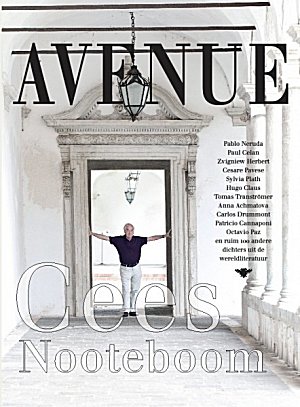
Ter gelegenheid van zijn tachtigste verjaardag verschijnt van romancier, reisschrijver en dichter Cees Nooteboom het boek ‘Avenue’, een bundeling van de vele literaire bijdragen die hij voor dit roemruchte Nederlandse tijdschrift schreef.
VPRO BOEKEN met Cees Nooteboom
zo 10 november 2013
Schrijver Cees Nooteboom had in 1955 een vliegende start met zijn debuutroman Philip en de anderen. Na 1963 reisde hij de hele wereld over en schreef hij lange tijd geen romans. Het reizen was goed te combineren met zijn werk als literair redacteur bij Avenue. De bijdragen die hij gedurende vijftien jaar voor dit roemruchte tijdschrift schreef, zijn nu gebundeld uitgegeven.
Deze aflevering van VPRO BOEKEN wordt a.s. zondag uitgezonden, om 11.20 uur op Nederland 1.
fleursdumal.nl magazine
More in: - Book News, Archive M-N, Art & Literature News, Cees Nooteboom
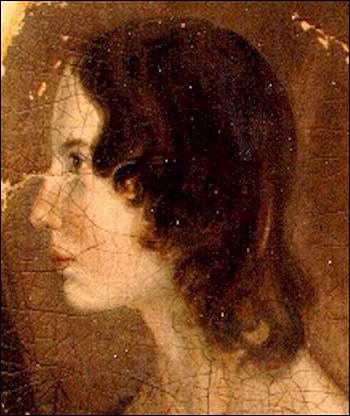
Emily Jane Brontë
(1818-1848)
Remembrance
Cold in the earth–and the deep snow piled above thee,
Far, far, removed, cold in the dreary grave!
Have I forgot, my only Love, to love thee,
Severed at last by Time’s all-severing wave?
Now, when alone, do my thoughts no longer hover
Over the mountains, on that northern shore,
Resting their wings where heath and fern-leaves cover
Thy noble heart for ever, ever more?
Cold in the earth–and fifteen wild Decembers,
From those brown hills, have melted into spring:
Faithful, indeed, is the spirit that remembers
After such years of change and suffering!
Sweet Love of youth, forgive, if I forget thee,
While the world’s tide is bearing me along;
Other desires and other hopes beset me,
Hopes which obscure, but cannot do thee wrong!
No later light has lightened up my heaven,
No second morn has ever shone for me;
All my life’s bliss from thy dear life was given,
All my life’s bliss is in the grave with thee.
But, when the days of golden dreams had perished,
And even Despair was powerless to destroy;
Then did I learn how existence could be cherished,
Strengthened, and fed without the aid of joy.
Then did I check the tears of useless passion–
Weaned my young soul from yearning after thine;
Sternly denied its burning wish to hasten
Down to that tomb already more than mine.
And, even yet, I dare not let it languish,
Dare not indulge in memory’s rapturous pain;
Once drinking deep of that divinest anguish,
How could I seek the empty world again?
.jpg)
Ellis Bell (Emily Jane Brontë) poetry
fleursdumal.nl magazine
More in: - Archive Tombeau de la jeunesse, Anne, Emily & Charlotte Brontë, Archive A-B, Brontë, Anne, Emily & Charlotte

Hans Hermans © photos: New York 2013 (3)
fleursdumal.nl magazine
More in: FDM in New York, Hans Hermans Photos
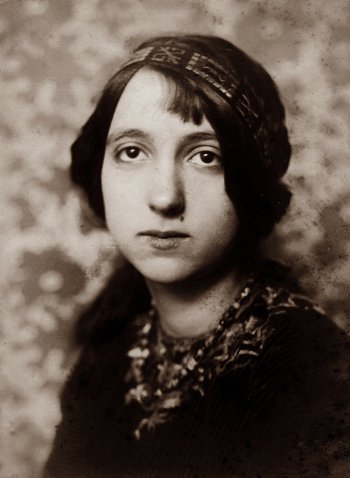
Mireille Havet
(1898-1932)
Connaissance
À la comtesse Jean de Limur
La vie souple, comme une cravache
en plein visage m’a flagellée.
Je m’en vais douce, inoffensive
dans le crépuscule printanier
qui emplit les rues de jeux de billes,
de marelles étoilées.
La lampe
allumée sur le potage,
les faïences,
tel qu’on aurait pu être,
Mais la vie trop souple
de sa fine lanière cingle
les enfants tristes,
et l’âme se plie féline,
domptée
vers la mort qui est sa récompense.
Les enfants du cordonnier
jouent dans la cour
avec des cris qui montent
rappelant des hangars, des faubourgs ;
un arbre bouge tout pointé
de bourgeons verts
et mes larmes sourdes et tenaces
sont prises en moi,
source merveilleuse qui chemine
et s’en va
sous la terre
s’épuiser au long des larmes stériles
de l’amour,
sous la lune grise
qui annonce la belle saison,
les mains enlacées
les lents et balancés
retours à la maison
— la nuit —
au matin l’aubépinier entier s’était fleuri,
et contre moi
comme une bête,
comme un ange terrassé
j’étrangle ma joie d’hier
neuve, insolente
et dont j’aimerais mourir
Ô solitude
magnifique et suprême
que ton dur visage
se mesure bien à mon regard,
face à face comme toujours,
mon âme nue se déploie
au silence des larmes.
Toute ma jeunesse me tire cependant
m’entraîne,
dans l’incroyable
foule humaine
et je reprends la chaîne qui nous lie
à la terre.
Il n’y a rien d’autre,
le pain quotidien
le travail
la jouissance étonnante
du chagrin
qui ressemble à la mer.
Nous mourons d’espoirs,
de nuances douces couleur de lilas
et plus fragiles encore au contact
des doigts
que le bleu effronté des papillons des îles.
Le coup direct ne tue pas si bien
que l’aiguillon secret
qui taquine en silence,
hameçon subtil
glissé dans l’eau
entre les tiges de lotus blancs.
Promenades en bateau,
première étoile
naissante
et qui éclate comme une fleur
à l’horizon des anges,
Vénus au nom de malheur.
J’ai tout vu
le balancement des rames
au fil du courant,
la main douce dans la petite vague
le charme des femmes
leur tendresse navrante
caprice sentimental d’un instant
ont perdu mon âme
qui cherchait leur douceur.
Hamlet, Ophélie, les deux pigeons.
Je poursuis le dérisoire visage de l’amour
au seuil condamnable
au seuil écolier
de mes vingt ans.
Très menteuse et très chère
je vous dédie et je vous signe
ce poème,
vous y retrouverez
tout ce que vous détestez en moi
et même le peu que vous aimiez.
Le jeu est fini
la comédie terminée,
je m’en retourne
front lourd et jambes rompues
vers mon enfance
à la poursuite de la lumière
que vous m’avez empoisonnée.
Ô menteuse
la plus cruelle,
souriez à l’éternelle méchanceté humaine
qui me fit en neuf jours
votre petit arlequin bariolé
et ce soir le pierrot balafré
qui vous quitte
visage blanc camouflé de gifles
dans l’incohérence crépusculaire
et douce
du printemps.
La Revue européenne n°3 (1er mai 1923)
Mireille Havet poetry
fleursdumal.nl magazine
More in: Archive G-H, Havet, Mireille, Mireille Havet

Ton van Reen
DE GEVANGENE XXVI (slot)
Ze liep haastig naar buiten. Het asvat van de familie F. lag om. Het was opengebarsten. Zou de asman tegen de vuilnisbak hebben getrapt? Zou hij daarom midden in de Libertystraat staan met zijn armen omhoog en naar lucht happend?
`Hé, asman!’ riep ze. `Er is geen verkeer in de Libertystraat! Auto’s hoef je niet tegen te houden en de processie is gisteren al langsgekomen.’
Had ze maar niet geroepen! Direct schaamde hij zich. Het had nergens op geleken. Ze had moeten weten dat de asman zich niets aantrok van het verkeer. Het niet nodig vond verkeer tegen te houden. De asman bleef staan, de armen in de lucht, en ging gewoon verder met zijn mond ademhalende bewegingen te maken.
Meneer Pesche, die net de straat uit liep en van plan was om te gaan eten in restaurant Varsgarten, dacht dat de asman naar hem zwaaide. Uitgelaten stak hij zijn scharrelhandjes in de lucht en zwaaide terug terwijl hij de deuren voorbijliep van de Uitdragerij van de Aangepaste Dood en de uitgeverij. Maar de asman zag hem niet. Ook trok hij zich niets aan van de man zonder rechterarm die de deur uit zijn huis had gebroken en bezeten met zijn afbouwhamer in de ene hand boven zijn hoofd zwaaiend de straat uit holde, of bijna was gestikt in de groene schemer van zijn cactushuis.
Het meisje stak pas de straat over toen ze zag dat Leo niet achter de ruit zat. In de gang van Leo’s huis overviel haar de angst. Ze holde de woonkamer binnen. Wat ze nooit had verwacht, was gebeurd. Leo was zijdelings uit zijn stoel gevallen, met zijn hoofd tegen de grond geslagen. Zijn schedel was gebarsten. De hersens waren uit de hersenpan gelopen.
Door het hele huis hing de lucht van bedorven voedsel.
Ze holde naar buiten, hoorde wat de asman schreeuwde. Hij schreeuwde niet als een vis. Hij schreeuwde tegen haar. Hij rende haar achterna, wilde haar slaan.
`Moordenares!’ riep hij. `Hoer! Jij hebt hem vermoord. Op de twintigste verjaardag die Leo achter zijn ruit vierde. Gisteren kwam je voor het eerst bij hem In de nacht nog wel. En tweemaal. Zijn hersenpan liep leeg. Ik begrijp je niet, slet. Je hebt toch zelf ook een eigen raam in de Libertystraat! Ga weg, hoer.’
Hij stond stil, draaide zich om. Ze zag dat hij de deur binnenging van de Uitdragerij van de Aangepaste Dood. Ze liep regelrecht naar de Tolsteeg.
`Ik kom hier wonen’, zei ze tegen de eerste de beste man die ze tegenkwam.
`Dat is best’, zei de man. `Je mag werken. Je kunt de toekomst voorspellen. Ik heb een tent en een glazen bol. Ik had nog geen meisje dat in de bol kan kijken.’
`Ik zal het proberen’, zei ze. Ze liep met de man mee.
Achter zijn huis stond een tent. Gekleurd zeil. Rood, oranje, groen. Dat vloekte. In de tent was een portaaltje met een voorhang. Achter het gordijn stonden een stoel en een tafel waarop een glazen bol lag.
`Je hoeft alleen maar in de bol te kijken’, zei de man. `De toekomst zie je vanzelf.’
`Het is goed’, zei ze.
`Kom’, zei de man. `We gaan in de deuropening zitten van mijn huis. De zon komt op. We werken nooit als de zon schijnt.’
Toen ze naast de man op de stoep zat, zag ze dat er kinderen speelden in de Tolsteeg.
Zou ik de taal van de kinderen en dieren nog ooit kunnen leren? dacht ze.
EINDE
fleursdumal.nl magazine
More in: - De gevangene
Thank you for reading Fleurs du Mal - magazine for art & literature